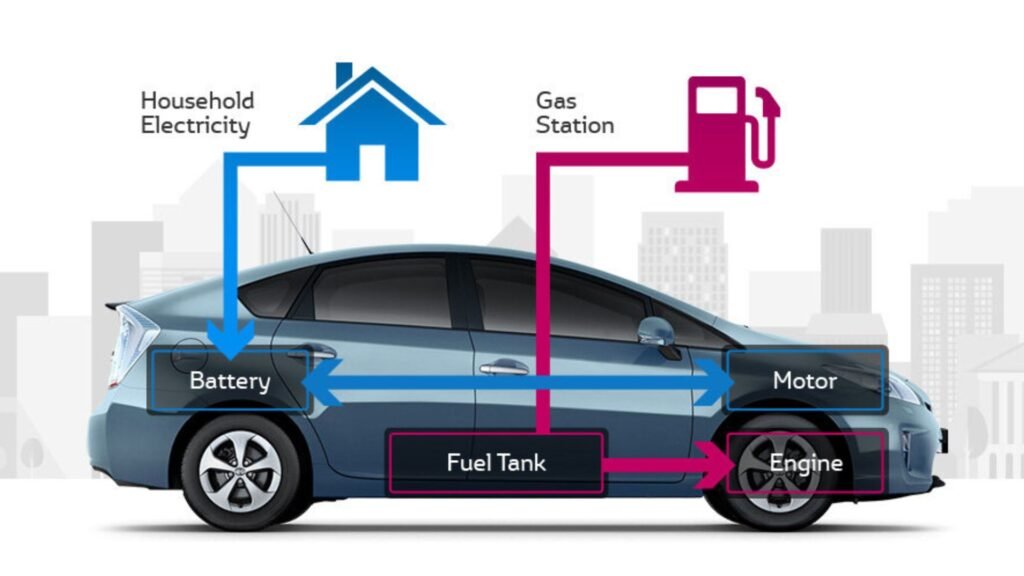Studies on Hybrid Vehicles Environmental Impact
Hybrid vehicles have gained popularity due to their ability to combine fuel efficiency with lower emissions. As more people consider switching to hybrid cars, understanding their environmental impact becomes crucial. Numerous studies have examined how hybrid vehicles affect the environment, providing valuable insights into their benefits and challenges. In this article, we will explore the findings from these studies on hybrid vehicles’ environmental impact and see how they contribute to a cleaner, more sustainable future.

1. Reduction in Greenhouse Gas Emissions
Lower CO2 Emissions
One of the most significant findings from studies on hybrid vehicles is their ability to reduce greenhouse gas emissions, particularly carbon dioxide (CO2). Traditional gasoline vehicles emit large amounts of CO2, contributing to global warming. However, hybrid vehicles use a combination of an internal combustion engine and an electric motor, which reduces the amount of fuel burned and, consequently, the CO2 emitted.
For instance, a study by the Environmental Protection Agency (EPA) found that hybrid vehicles emit up to 50% less CO2 than traditional cars. This reduction plays a vital role in mitigating climate change and promoting environmental sustainability.
Benefits for Urban Areas
Moreover, studies have shown that hybrid vehicles are especially beneficial in urban areas. Cities often struggle with high levels of air pollution due to dense traffic. Hybrid vehicles, which produce fewer emissions, can help improve air quality in these areas. By reducing the concentration of harmful gases, hybrids contribute to healthier living conditions for city residents.
2. Decreased Fuel Consumption
Improved Fuel Efficiency
Another key area where hybrid vehicles make a positive environmental impact is fuel consumption. Hybrids are designed to be more fuel-efficient than traditional vehicles. The electric motor in a hybrid vehicle assists the gasoline engine, allowing it to run less frequently and consume less fuel.
Research conducted by the International Council on Clean Transportation (ICCT) shows that hybrid vehicles can achieve up to 30-50% better fuel efficiency than conventional cars. This means fewer trips to the gas station, lower fuel costs, and reduced dependence on fossil fuels, which is crucial for environmental conservation.
Lower Resource Use
Additionally, decreased fuel consumption means that fewer natural resources are required to produce fuel. This reduces the environmental impact of drilling, refining, and transporting oil. Therefore, by driving a hybrid vehicle, you not only save money on fuel but also contribute to the preservation of natural resources.
3. Impact of Battery Production and Disposal
Environmental Costs of Battery Production
However, studies also highlight some environmental challenges associated with hybrid vehicles, particularly regarding battery production and disposal. Hybrid vehicles use large batteries, often made of materials like lithium, cobalt, and nickel. The mining and processing of these materials can have significant environmental impacts, including habitat destruction, water pollution, and high energy consumption.
A study published in the Journal of Industrial Ecology found that the production of hybrid vehicle batteries can result in substantial emissions and resource use. This is a key consideration when evaluating the overall environmental impact of hybrid vehicles.
Battery Disposal and Recycling
Furthermore, the disposal of used batteries poses another challenge. If not properly managed, discarded batteries can leak toxic substances into the environment. However, the good news is that many studies are exploring ways to recycle hybrid vehicle batteries effectively. Recycling can recover valuable materials and reduce the environmental impact associated with battery disposal. Companies and researchers are working on improving recycling technologies to ensure that hybrid vehicles remain a sustainable choice.
4. Life Cycle Analysis of Hybrid Vehicles
Comprehensive Environmental Impact
To fully understand the environmental impact of hybrid vehicles, many studies have conducted life cycle analyses (LCA). LCA examines the environmental effects of a product from its production to its disposal. For hybrid vehicles, this includes the energy and resources used in manufacturing, the emissions produced during driving, and the environmental costs of recycling or disposing of the vehicle at the end of its life.
According to a comprehensive LCA study by the European Environment Agency (EEA), hybrid vehicles generally have a lower overall environmental impact than traditional vehicles, even when considering battery production and disposal. The study concluded that the benefits of reduced emissions and fuel consumption outweigh the environmental costs of producing and disposing of hybrid vehicle batteries.
Hybrid vs. Electric Vehicles
Interestingly, the same studies often compare hybrid vehicles with fully electric vehicles (EVs). While EVs have zero tailpipe emissions, their batteries are larger and may have a greater environmental impact during production. However, hybrids strike a balance by offering significant emission reductions with smaller batteries, making them a viable option for those concerned about the environmental impact of battery production.
Conclusion
In conclusion, studies on hybrid vehicles’ environmental impact reveal that these vehicles offer substantial benefits, particularly in reducing greenhouse gas emissions and fuel consumption. However, the production and disposal of hybrid vehicle batteries present challenges that need to be addressed. Despite these challenges, hybrid vehicles remain a positive step toward a more sustainable future. With ongoing advancements in battery technology and recycling, the environmental benefits of hybrid vehicles will likely continue to grow, making them an increasingly attractive option for eco-conscious drivers.

